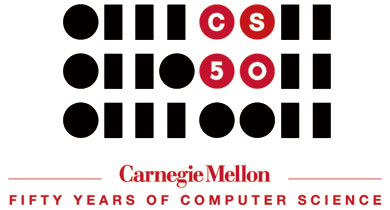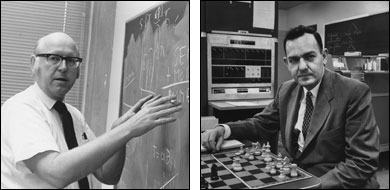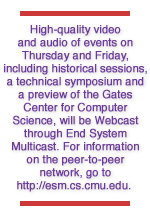|
|
||||
|
|
Carnegie Mellon Celebrates 50 Years of Computer Science Excellence
Computers were crude, number-crunching machines when the then-Carnegie Institute of Technology installed its first electronic computer in the summer of 1956. But professors Herbert Simon and Allen Newell already had figured out how to make them think.
Their invention, the first artificially intelligent computer program, only scratched the surface of the computer's potential. So pioneering researchers from business, psychology, electrical engineering and mathematics joined together to explore and exploit the computer's potential, forming the Computation Center headed by Alan Perlis.
In the process, computation became a science and the institution now known as Carnegie Mellon University became a leading center for the new academic discipline.
More than 500 corporate and academic leaders in computer science and prominent alumni will celebrate those 50 years of innovation in computing when they gather at Carnegie Mellon April 19-22 for CS50: Fifty Years of Computer Science, a campus-wide event hosted by the School of Computer Science.
Allan Newell (left) and Herbert Simon invented the first artificially intelligent computer program at Carnegie Tech in 1956. (Photos courtesy of Carnegie Mellon University Archives.)
The impact of computers and computer science on society over the past half-century has been immense and Carnegie Mellon researchers have developed many of the operating systems, programming languages and Internet search methods that are used in today's digitized world.
"Carnegie Mellon showed the world how to think broadly about computing and all its possibilities, and Carnegie Mellon scientists have continually revitalized computer science over these decades," said Carnegie Mellon President Jared L. Cohon. "Their impact is felt across nearly every discipline and field of endeavor, wherever people seek to solve complex problems."
Highlights of the four-day event include a visit from Pennsylvania Governor Ed Rendell on April 19, reminiscences of founding faculty members and former students on April 20, and a technical symposium and preview of the design for the school's new home, the Gates Center for Computer Science, on April 21.
"Preparing for CS50 has given me the opportunity to look into our past and gain an even greater appreciation for the foresight of our founders," said Randal E. Bryant, dean of the School of Computer Science. "The insights Newell and Simon had into the human thought process and how it can be implemented by computers set the course for artificial intelligence that continues to provide research challenges today. Perlis' energy and enthusiasm can be seen today in the way computer technology pervades our entire university."
The university established one of the first computer science departments in 1965 and created the School of Computer Science in 1988.
In addition to marking 50 years of computer science, CS50 also celebrates the 12th anniversary of the Human-Computer Interaction Institute and the 20th anniversary of the Language Technologies Institute — two of the six units within the School of Computer Science. The school's other units are the Computer Science Department, the Robotics Institute, the Machine Learning Department and the Institute for Software Research International.
For more information, including registration details and a full schedule of events, check the CS50 Web site: www.cs50.cs.cmu.edu.
CS50 Schedule of Events
April 19: Governor Rendell To Speak; Robot Hall of Fame Announcement
Pennsylvania Gov. Ed Rendell will kick off CS50 at 10:30 a.m., April 19, when he will talk about science, technology and innovation in the "New Pennsylvania." That evening, this year's inductees into Carnegie Mellon's Robot Hall of Fame will be announced during an opening-night reception at the university's Entertainment Technology Center.
April 20: Looking Back on 50 Years
The history of computer science will be the focus of the first full day of CS50, with alumni speakers including Charles M. Geschke, co-founder of Adobe Systems; and Edward Feigenbaum, an artificial intelligence pioneer at Stanford University. Former faculty member C. Gordon Bell, a computer visionary and Microsoft Corp. telepresence researcher, will make a virtual appearance. A gala reception is scheduled in the evening at the National Robotics Engineering Consortium in Lawrenceville.
April 21: Challenges for the Future
A technical symposium in the University Center's McConomy Auditorium will look to the future of computer science. Alumna and former Pentagon research director Anita K. Jones will speak, as will faculty members Raj Reddy, the Mozah Bint Nasser University Professor of Computer Science and Robotics and former SCS dean; and Latanya Sweeney, director of the school's Data Privacy Lab. The design of the 209,000-square-foot Gates Center for Computer Science will be previewed at 6 p.m. in the CS50 tent next to the University Center. For more information on the Gates Center project, visit http://www.cmu.edu/cmnews/extra/060407_gates.html .
April 22: Tours, Demos and Open House
The final day will include a number of tours, demonstrations and open houses, including the Entertainment Technology Center and the new quarters on Craig Street for the software engineering group.
Byron Spice |
||
|
Carnegie Mellon Home |
||||


 Carnegie Mellon scientists have built robots that explored active volcanoes, discovered meteorites in Antarctica and negotiated the 130-mile Grand Challenge desert race. They have built more than 20 generations of wearable computers, devised machines for the automated translation of text and speech, and are using linguistic methods to decode the "language" of the human genome. Today they are seeking to enhance the quality of life of all people by applying computer technologies to health- and life-related issues.
Carnegie Mellon scientists have built robots that explored active volcanoes, discovered meteorites in Antarctica and negotiated the 130-mile Grand Challenge desert race. They have built more than 20 generations of wearable computers, devised machines for the automated translation of text and speech, and are using linguistic methods to decode the "language" of the human genome. Today they are seeking to enhance the quality of life of all people by applying computer technologies to health- and life-related issues.